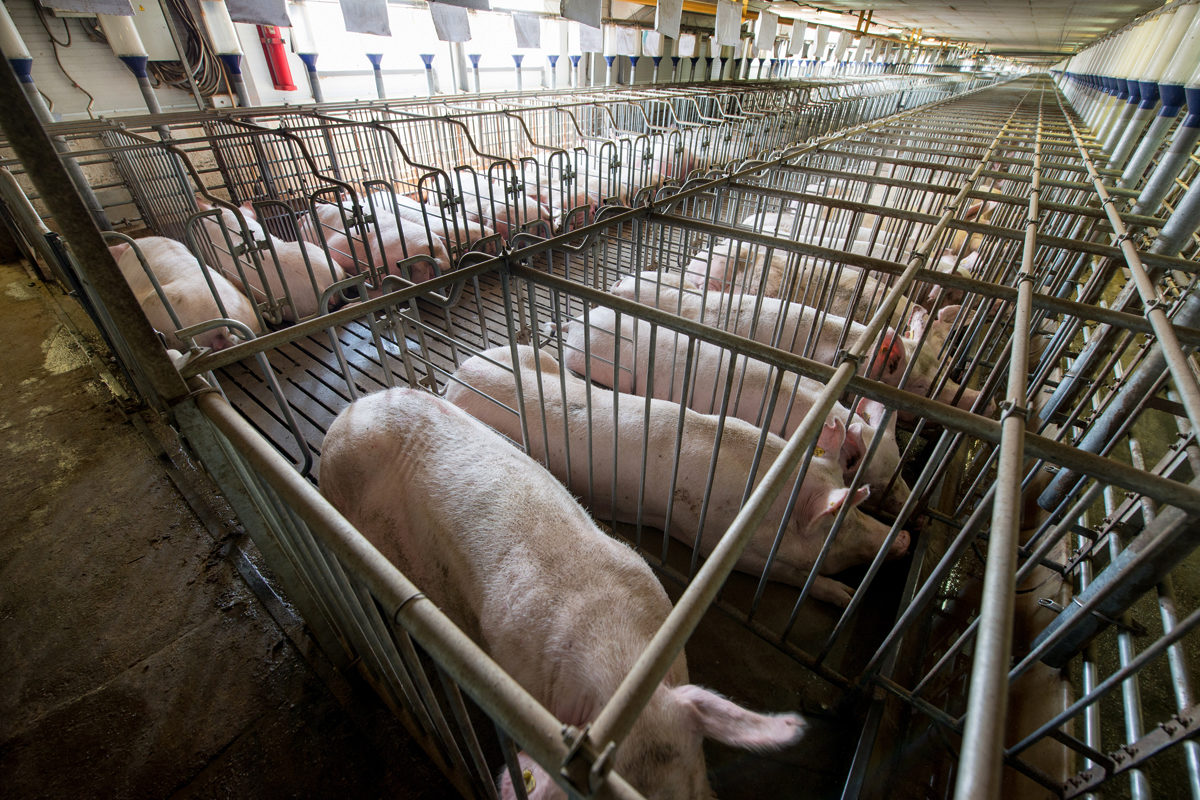Saying Good-bye To Animal Cruelty

With all the hubbub surrounding the midterm elections, it may have been overlooked that the scene depicted in the photo above, i.e., pigs spending their entire lives in tiny cages, will no longer be a part of life here. Same goes for egg-laying hens. Additionally, all eggs, veal, and pork sold in the state will meet this standard.
If you’re OK with animal cruelty, do it in Alabama. And do it quickly, because, as noted above, good ideas spread out of here, and they move fast.

Craig,
On the whole such laws are very good improvements, especially when it comes to such highly intelligent animals as pigs.
No one likes animal cruelty, but it’s a mistake to attribute human concepts and attributes to all animals. Most domesticated livestock do not have any deep yearning for freedom etc. In fact, most domesticated pets live much better lives and much longer than their compatriots in the wild.
Most domesticated animals never existed in a ‘natural’ state ! Generations of human controlled selective breeding has produced whole new species, completely unrecognizable from their distant ancestors.
Most of livestock couldn’t exist in nature. I’m afraid a Pekinese would find life as a wolf, very difficult indeed! Many animals such as modern egg laying breeds of chicken, are delighted not to live their lives in terror of being prey to a host of predators and finding sufficient food.
Battery farming when done badly or incompetently is very distressing, and other more humane productive methods are becoming popular.
But free range farming methods come at considerable cost, especially for the poor. It’s the poor in California who will pay for the fashionable principles of idealistic politically motivated trendy suburbanites.
Eggs will more than double in price, removing a major source of cheap protein for 15% of California’s poorest citizens. Pork will become beyond the budget of at least 20%. The issue with Veal is largely obsolete.
Free range farming also has a much greater environmental footprint and very costly in terms of land usage, fodder/feed, infrastructure, veterinary, security, and animal welfare.
This is a real problem for those involved in primary production whose livelihoods and investment are constantly threatened by ill-informed laws and concepts conceived by people who are very emotional, but lack any idea about farming or animal husbandry.
This will become an increasing problem as cities become ever larger (and more arrogant)while rural populations continue to shrink.
Factory farming may not seem pleasant, but nor is expanding the area of farmland to compete with natural park lands.
Pig farms (or hog ranches) are very difficult businesses. Pigs are constitutionally identical to humans, in other words, cross species epidemics (the spread of African Swine Fever is a good example) are far more of a problem with pigs than any other animal. Commercial pig farming needs to be very controlled and hygienic which is not easy when dealing with an animal which lacks sweat glands and likes to roll in mud.
Pigs are environmentally very destructive. In nature, pigs serve a useful role in tearing up scrub and forest land while foraging for roots. In pastureland, a good size herd of pigs can lay waste to vast acreages of land, leaving behind eroded deserts, with little topsoil.
Many years ago my late step-father wanted to fund a project to breed a sort of genetically modified pig. This animal would lack senses, limbs and cognitive brain capacity, essentially it would be a vegetable, living it’s short life in a factory.
I can remember the outrage especially among my fellow university students at such an unethical concept, yet I was intrigued by both sides of the moral/ethical issus and encouraged a formal scheduled debate to explore the arguments.
I was saddened to witness the hysteria (the was the early 1970’s) of my fellow University students who demanded no such discussion take place. The University authorities caved in and banned the debate for fear of organized violence by leftists and radicals, including bomb threats. (Having just returned from 3 active tours of duty in Vietnam, I was a little disappointed by the lack of moral spine by the University authorities for caving into such ratbags).
I wish California well with these reforms, and hope they are implemented fairly and with good commonsense and moderation.
For myself, I would rather people ate more eggs and chicken, and allowed fish and oceanic marine life stocks to recover.
In the UK we operate a smallish piggery on my family estate. The figs live most of there lives indoors from preference. Each barn has an outdoor ‘exercise’ area, and some pigs frequent this area while the majority would rather stay in the temperature controlled rather sanitized indoor areas.
The structure are divided with separate areas for breeding and nurseries, but the sheds are deliberately constructed with interconnecting passageways and differences to promote social movement and roaming. We produce our own brand of bacon, ham’s, sausages and smoked pork products, value adding by selling to restaurants, specialist purchasers etc.
(For years I’ve given my colleagues and client’s Christmas gifts of Pork and Game hampers, and my brother tells me we should invest in a larger piggery in Yorkshire to keep up with increasing demand. This year we are adding smoked kangaroo meat from Australia, to accompany the Australian Red Wine in the hampers as a sort of post-brexit Australian export drive!).
As I say, I wish California well with implementing this policy.